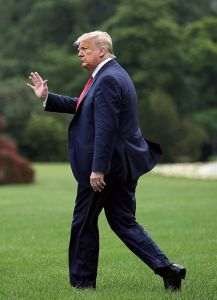In October 2016, the governor of the NBR was saying that "throughout my career I have not seen a better macroeconomic situation for Romania", which was accompanied by "the greatest risks".
Unfortunately, that economic context was already marked by the sharp increase in the foreign and budget deficit.
In an article published this spring ("Condamnaţi la stagflaţie"/Sentenced to stagflation, BURSA, April 4th, 2019) I presented the correlation between the foreign and the budget deficit of our country, starting from the specialized literature on "twin deficits", which have been studied more thoroughly from an empiric standpoint for at least a quarter of a century.
Starting from the weight of the current account deficit and the budget deficit in GDP, we can see the almost parallel evolution of the two indicators, especially in the last 10 years.
"If fiscal deficits are not offset by an increase in private savings compared to private investments, then the budget deficit will lead to growing trade deficits", wrote US Professor Steve Hanke of Johns Hopkins University in a December 2018 Forbes article.
Considering increase of the negative trend of the current account in relation to the budget deficit, I also wrote that "the probability of an underestimation of the budget deficit is very high".
After only half a year, that very high probability has turned into certainty. Why didn't the red light on the "dashboard" of the NBR turn on at least then? Or maybe it did, but was ignored because there were other priorities of national interest at the time?
Now, seemingly out of the blue, the issue of twin deficits seems to have come to the attention of NBR officials. "We, at the National Bank of Romania, stand by our our opinion that the correction of the foreign deficit should be done mainly through the correction of the public deficit," said Governor Mugur Isarescu at the annual conference organized by the Association of Financial Banking Analysts of Romania.
Moreover, the head of the NBR said that it is not enough just to weaken the exchange rate to correct the foreign deficit, especially since the depreciation would have serious effects on the budget deficit.
Indeed, the depreciation of the leu is not sufficient to correct the imbalances accumulated as a result of the serious errors in the monetary and fiscal policy of the last decade.
Even if that phenomenon is not desired by the authorities, and the National Bank's foreign reserves were used to temper the depreciation, the control of the exchange rate is only a very dangerous illusion.
The volatility of the last few days is only a strong alarm signal, and the stabilization of the exchange rate can only be considered a temporary phenomenon.
Would there be any positive effect if we "end the exchange rate discussion", as the governor urged? Absolutely not, especially when the state authorities can no longer avoid the correction the fundamental factors that support the value of a national currency.
""National currencies get stronger or weaker because that is how international capital expresses its faith in the government," wrote renowned American analyst Martin Armstrong on his website, where he also underlined the factors that determine their value.
In his opinion, "the value of any currency is supported by the total productive capacity of the population", which is influenced by education, the extent of the workforce force qualification, and an influence of the government on the economy and culture that is as low as possible.
Armstrong provided an example that is extremely relevant to our country as well. After the reunification of Germany, a friend told him that he had recovered his properties in Eastern Germany and would invest in building a factory, as he was convinced that "Germans have a good work ethic and that is passed down genetically".
The American analyst warned him that the decision was unwise and that one can't rely on work ethic where it does not exist. Less than two years later, Armstrong's friend had to give up on the business.
All of the four factors which determine productive capacity have been heavily undermined in our country, and perhaps some have even been completely destroyed in decades of communist indoctrination. Then Romania entered a prolonged "transition", marked, in the first years, by an explosive price increase, with dramatic effects on social cohesion and the entrepreneurial culture.
That is the result of irresponsible monetary and fiscal policies, that was almost constantly marked by a pro-cyclicalness in the last three decades.
Because the construction of the national capital is a long and difficult process, even without permanent obstacles on the part of the "authorities", the easy solution of financializing the economy and creating the illusion of wealth by inflating real estate bubbles and consumption on debt was adopted.
Despite the dramatic lessons offered by the crisis of the end of the last decade, it seems that everything has been forgotten, and the government authorities have applied irresponsible economic policies, which have led to an increase in the divergence between the dynamics of public debt and Gross Domestic Product, even though our country has experienced the biggest economic growth in the EU for a few years.
The ultra-relaxed monetary policy has fully facilitated this dynamic of public debt, and interest rates that are still close to historic lows, against the backdrop of a similar context on international markets, further fuel the illusion of its sustainability.
And because no one wants to take responsibility for the "implementation" of these policies, any signal transmitted by the "agitation" of the exchange rate is blamed on speculative attacks.
Once again officials of the NBR, as well as of the Fiscal Council, have recently expressed concern about the opportunity and sustainability of the new pension hikes in 2020.
But why was the problem discovered only now, even though the law had been passed a long time ago? And if that is the case, could it be due to the NBR having other priorities?
After warning that it is necessary to postpone the increase of pensions, because the budget cannot support it, the chief economist of the institution, Valentin Lazea, has published four arguments that should, in his opinion, be explained to the pensioners.
Lazea says that the pension raise this year already covers "the inflation rate and next year's GDP growth", but he does not pursue that "arithmetic" further, even although the announced hikes are permanent.
There is nothing to say about his second argument, according to which "the pensioners are not the people with the highest risk of poverty in Romania", except maybe it's in a league of its own when it comes to stupidity.
The other two arguments argue that budgetary resources should be directed more towards investments rather than consumption, because otherwise "we will not have the economic resources to repay loans and young people will continue to leave the country" and "a big short-term gain" can turn into a great loss for them and the rest of the population. " But who is going to make those investments?
Unfortunately, the chief economist of the National Bank did not mention, at the top of the list, the fundamental argument: that the public pension system is, in fact, a Ponzi scheme, and this system cannot be sustained, with the population aging and shrinking workforce.
The situation of the public pension system is also a consequence of the serious structural problems of the national economy, a list which starts with the chronic capital deficit in the nation's private sector.
After strolling for a while, our leu (ed. note: lion) now seems to have become a frightened cat, but one which has nowhere to hide to escape the consequences of irresponsible economic policies.
Adrian Vasilescu, strategy consultant with the National Bank of Romania (BNR), told us, ahead of the November 29th issue, that Romania is experiencing "November syndrome". He explained: "On November 1st, the November syndrome happened almost automatically. November is the last of month of autumn, December is on the horizon, winter is near, so are the holidays and the general rule that has become the norm is that imports outweigh the exports. In November, importers buy their goods for December and this is how the November syndrome occurs. They go on the foreign exchange market, exchange lei for foreign currency and that's it, the effect has occurred. Later, it will recover, but there is that pendulum effect which occurs ".
















































